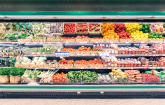New report shows slow progress from largest U.S. grocery retailers and identifies emerging private label options as public demands alternatives to factory-farmed products
NEW YORK, Aug. 1, 2024 /PRNewswire/ -- As consumers continue to demand higher welfare food options, the ASPCA® (The American Society for the Prevention of Cruelty to Animals®) today launched the latest ASPCA Supermarket Scorecard, the only consumer resource that ranks grocery retailers in the United States on multiple farm animal welfare issues. The scorecard is part of the ASPCA's Shop with Your Heart® program, launched in 2016 to inform consumers, food businesses and lawmakers about solutions that will improve the lives of animals raised for food. Building on last year's inaugural scorecard, which evaluated supermarkets on three critical animal welfare issues in their supply chains—cage confinement of laying hens, crate confinement of pregnant pigs, and both the treatment and breed health of chickens raised for meat—this second annual report includes additional retailers and a new assessment of whether companies are eliminating the most inhumane farming practices from their own private labels.
This year's findings show that some stores are heeding the public cry for change in our food system by progressing on their promises to eliminate inhumane practices from store shelves and are incorporating higher welfare products into their private lines. Several retailers are offering private-label products at lower prices than independent brands that are using industrial practices like caging. For the second year, Whole Foods Market® and Sprouts Farmers Market® scored highest while many retailers fell further behind by failing to address farm animal welfare. Additional insights include:
- Four Supermarket Chains Have Made Progress Since Last Year: Four stores are advancing on their promises to eliminate confinement in their supply chains: Albertsons®, Key Food®, The Kroger Co.® and Safeway®. These stores either improved their farm animal welfare policies or reported progress since last year.
- Eggs Lead Higher Welfare Private-Label Options: All evaluated stores except Piggly Wiggly® were found to offer cage-free, private-label eggs while nine supermarkets also stock at least some store-brand pork products that are gestation crate-free.
- Four Grocery Retailers Lag Behind: Unlike their peers, Piggly Wiggly, Save A Lot®, Trader Joe's® and Winn-Dixie® have still made no storewide commitments to address critical farm animal welfare issues in the future, despite growing public demand and the increasing availability of higher welfare options.
Most of the nearly 10 billion animals raised for food in the U.S. endure suffering on industrial facilities known as factory farms that contribute to climate change, public health risks and rural economic decline. Results from a national public opinion survey found that most of the public (91 percent) want companies to address the treatment of farm animals and the environment as a part of their corporate sustainability programs, with most willing to switch supermarkets if they learned that theirs did not offer more humane alternatives to factory-farmed food. Progressive Grocer's 2024 Consumer Expenditures Study found that one-third of shoppers are buying more store brands and consider ethical sourcing to be very important, making higher welfare private-label products a prime opportunity for supermarkets to earn and keep customer loyalty.
"Stores that hope to appeal to the growing number of consumers who are concerned about animal welfare can no longer ignore the plight of farmed animals―and for those supermarkets, there's no better place to start than their own private labels," said Nancy Roulston, senior director of corporate policy & animal scientist, ASPCA Farm Animal Welfare. "By choosing which products fill their shelves, supermarkets determine the welfare of billions of animals and the survival of higher welfare farms across the country, so it has never been more urgent that they set strong animal welfare policies and reliably offer shoppers more humanely raised products."
As part of the ASPCA's work to support more humane farming, the scorecard is designed to encourage supermarkets to source from the growing number of egg, pork and chicken brands that have invested in higher welfare standards, including the hundreds of products that appear on the ASPCA's Shop With Your Heart Grocery List.
"Pete & Gerry's® and Nellie's® Free Range egg brands were built on two principles: hen welfare and supporting family farmers. We applaud the ASPCA for its role in animal welfare education and believe that when consumers understand the different ways animals are treated, they make better choices," said Tom Flocco, CEO of Pete & Gerry's. "Whether Free Range or Pasture Raised, all our hens have access to the outdoors and are never caged, making for happier, healthier hens and better eggs."
"Every purchase of gestation crate free pork at the grocery store directly invests in not just a better life for the animal but also better lives for family farmers raising animals the right way while supporting communities throughout rural America," said Paul Willis, founding hog farmer of Niman Ranch, a network of over 600 Certified Humane® farms and ranches. "I applaud those grocers who are listening to consumer demand by carrying higher welfare meats and hope to see more retailers follow their lead to support a better food system."
"For the past 16 years we have invested in higher welfare chicken breeds, recognizing that these animals' welfare is deeply connected to their genetics, and that today's customers are looking for more humanely raised chicken," said David Pitman, owner of Mary's Free Range Chicken. "We are proud to offer our pasture-raised Mary's heirloom chicken using the Pioneer breed and free-range Mary's Legacy chicken, both approved by the Better Chicken Commitment, and we hope more supermarkets across the country will offer shoppers higher welfare chicken."
To learn more about the ASPCA's work with companies to help create more humane policies for farm animals and find interactive resources to bring your store on board, visit ASPCA.org/SupermarketScorecard.
About the ASPCA®
Founded in 1866, the ASPCA® (The American Society for the Prevention of Cruelty to Animals®) was the first animal welfare organization to be established in North America and today serves as the nation's leading voice for vulnerable and victimized animals. As a 501(c)(3) not-for-profit corporation with more than two million supporters nationwide, the ASPCA is committed to preventing cruelty to dogs, cats, equines, and farm animals throughout the United States. The ASPCA assists animals in need through on-the-ground disaster and cruelty interventions, behavioral rehabilitation, animal placement, legal and legislative advocacy, and the advancement of the sheltering and veterinary community through research, training, and resources. For more information, visit www.ASPCA.org, and follow the ASPCA on Facebook, X, Instagram, and TikTok.
SOURCE ASPCA®

WANT YOUR COMPANY'S NEWS FEATURED ON PRNEWSWIRE.COM?
Newsrooms &
Influencers
Digital Media
Outlets
Journalists
Opted In






Share this article